七年级英语上下Microsoft Word 文档
(word版)人教版七年级英语上册各单元知识点(详细),文档
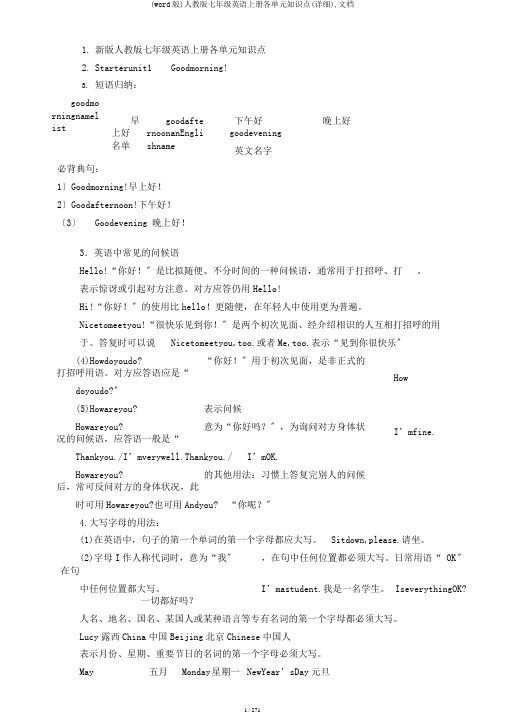
1.新版人教版七年级英语上册各单元知识点2.Starterunit1 Goodmorning!3.短语归纳:goodmorningnamel ist早上好名单goodafternoonanEnglishname下午好goodevening英文名字晚上好必背典句:1〕Goodmorning!早上好!2〕Goodafternoon!下午好!〔3〕Goodevening 晚上好!3.英语中常见的问候语Hello!“你好!〞是比拟随便、不分时间的一种问候语,通常用于打招呼、打。
表示惊讶或引起对方注意。
对方应答仍用Hello!Hi!“你好!〞的使用比hello!更随便,在年轻人中使用更为普遍。
Nicetomeetyou!“很快乐见到你!〞是两个初次见面、经介绍相识的人互相打招呼的用于。
答复时可以说Nicetomeetyou,too.或者Me,too.表示“见到你很快乐〞(4)Howdoyoudo? “你好!〞用于初次见面,是非正式的打招呼用语。
对方应答语应是“doyoudo?〞(5)Howareyou? 表示问候Howareyou? 意为“你好吗?〞,为询问对方身体状况的问候语,应答语一般是“Thankyou./I’mverywell.Thankyou./I’mOK.Howareyou? 的其他用法:习惯上答复完别人的问候后,常可反问对方的身体状况,此时可用Howareyou?也可用Andyou? “你呢?〞HowI’mfine.4.大写字母的用法:(1)在英语中,句子的第一个单词的第一个字母都应大写。
Sitdown,please.请坐。
(2)字母I作人称代词时,意为“我〞,在句中任何位置都必须大写。
日常用语“ OK〞在句中任何位置都大写。
I’mastudent.我是一名学生。
IseverythingOK?一切都好吗?人名、地名、国名、某国人或某种语言等专有名词的第一个字母都必须大写。
Lucy露西China中国Beijing北京Chinese中国人表示月份、星期、重要节日的名词的第一个字母必须大写。
英语中所有动词短语和短语动词 Microsoft Word 文档
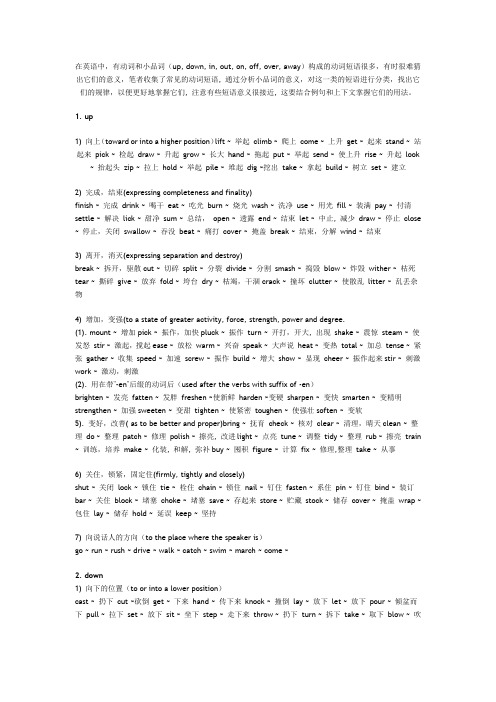
在英语中,有动词和小品词(up, down, in, out, on, off, over, away)构成的动词短语很多,有时很难猜出它们的意义,笔者收集了常见的动词短语, 通过分析小品词的意义,对这一类的短语进行分类,找出它们的规律,以便更好地掌握它们, 注意有些短语意义很接近, 这要结合例句和上下文掌握它们的用法。
1. up1) 向上(toward or into a higher position)lift ~ 举起climb ~ 爬上come ~ 上升get ~ 起来stand ~ 站起来pick ~ 检起draw ~ 升起grow ~ 长大hand ~ 拖起put ~ 举起send ~ 使上升rise ~ 升起look ~ 抬起头zip ~ 拉上hold ~ 举起pile ~ 堆起dig ~挖出take ~ 拿起build ~ 树立set ~ 建立2) 完成,结束(expressing completeness and finality)finish ~ 完成drink ~ 喝干eat ~ 吃光burn ~ 烧光wash ~ 洗净use ~ 用光fill ~ 装满pay ~ 付清settle ~ 解决lick ~ 甜净sum ~ 总结,open ~ 透露end ~ 结束let ~ 中止, 减少draw ~ 停止close ~ 停止,关闭swallow ~ 吞没beat ~ 痛打 cover ~ 掩盖break ~ 结束,分解wind ~ 结束3) 离开,消灭(expressing separation and destroy)break ~ 拆开,驱散cut ~ 切碎split ~ 分裂divide ~ 分割smash ~ 捣毁blow ~ 炸毁wither ~ 枯死tear ~ 撕碎give ~ 放弃fold ~ 垮台dry ~ 枯竭,干涸crack ~ 撞坏 clutter ~ 使散乱litter ~ 乱丢杂物4) 增加,变强(to a state of greater activity, force, strength, power and degree.(1). mount ~ 增加pick ~ 振作,加快pluck ~ 振作turn ~ 开打,开大, 出现shake ~ 震惊steam ~ 使发怒stir ~ 激起,搅起ease ~ 放松warm ~ 兴奋speak ~ 大声说heat ~ 变热total ~ 加总tense ~ 紧张gather ~ 收集speed ~ 加速screw ~ 振作build ~ 增大show ~ 显现 cheer ~ 振作起来stir ~ 刺激work ~ 激动,刺激(2). 用在带"-en"后缀的动词后(used after the verbs with suffix of -en)brighten ~ 发亮fatten ~ 发胖freshen ~使新鲜harden ~变硬sharpen ~ 变快smarten ~ 变精明strengthen ~ 加强sweeten ~ 变甜tighten ~ 使紧密toughen ~ 使强壮soften ~ 变软5). 变好,改善( as to be better and proper)bring ~ 抚育check ~ 核对clear ~ 清理,晴天clean ~ 整理do ~ 整理patch ~ 修理polish ~ 擦亮, 改进light ~ 点亮tune ~ 调整tidy ~ 整理rub ~ 擦亮train ~ 训练,培养make ~ 化装, 和解, 弥补buy ~ 囤积figure ~ 计算fix ~ 修理,整理take ~ 从事6) 关住,锁紧,固定住(firmly, tightly and closely)shut ~ 关闭lock ~ 锁住tie ~ 栓住 chain ~ 锁住nail ~ 钉住fasten ~ 系住pin ~ 钉住bind ~ 装订bar ~ 关住block ~ 堵塞choke ~ 堵塞save ~ 存起来store ~ 贮藏stock ~ 储存cover ~ 掩盖wrap ~ 包住lay ~ 储存hold ~ 延误keep ~ 坚持7) 向说话人的方向(to the place where the speaker is)go ~ run ~ rush ~ drive ~ walk ~ catch ~ swim ~ march ~ come ~2. down1) 向下的位置(to or into a lower position)cast ~ 扔下cut ~砍倒get ~ 下来hand ~ 传下来knock ~ 撞倒lay ~ 放下let ~ 放下pour ~ 倾盆而下pull ~ 拉下set ~ 放下sit ~ 坐下step ~ 走下来throw ~ 扔下turn ~ 拆下take ~ 取下blow ~ 吹倒bring ~ 打倒hang ~ 垂下sink ~ 沉落slip ~ 失足squat ~ 蹲下swallow ~ 吞下stoop ~ 伏身splash ~ 飞溅而下touch ~ 降落bend ~ 弯下bow ~ 鞠躬kneel ~ 跪下lie ~ 躺下strip ~ 脱下2) 减少(强度,量和体积)(a decrease in intensity, amount, bulk)dwindle ~ 减少die ~ 变弱,逐渐停止go ~ 平静下来mark ~ 削减hold ~ 压低burn ~ (火)减弱, 烧坏slow ~ 慢下来burn ~ 烧掉wash ~ 冲淡 clean ~ 弄干净rub ~ 擦干净bring ~ 降低keep ~ 缩减trim ~ 裁减water ~ 冲淡thin ~ 减少run ~ 用光衰弱wear ~ 削减,磨损come ~ 下跌knock ~ 降价3) 停止,减弱(to a state of less activity, force, strength and power)close ~ 关闭drop ~ 突然停止break ~ 坏了,中止run ~ 停止settle ~ 平静下来 cool ~ 冷静下来turn ~ 拒绝die ~ 停止lay ~ 失望put ~ 镇压4) 紧紧地,牢牢地(firmly, tightly) fasten ~ 系牢 chain ~ 链住,栓住clamp ~ 夹住nail ~ 钉住pin ~ 扣牢hammer ~ 钉上tie ~ 栓住bind ~ 捆绑draw ~ 停下来5) 写下,记下(on paper or in writing) write ~ 写下copy ~ 抄下note ~ 记下take ~ 记下put ~ 记下get ~ 记下have ~ 写下3 on1) 继续(continuously)carry ~ drive ~ fight ~ hold ~ keep ~ live ~ sleep ~ sing ~ walk ~ go ~ hurry ~ move ~ read ~ follow ~ struggle ~ insist ~ 坚持2) 连上,固定住,(in or into a state of being connected)act ~ 对…起作用catch ~ 抓牢 come ~ 跟随count ~ 依赖draw ~ 带上,穿上fasten ~ 纠缠,抓牢fit ~ 固定get ~ 接近paste ~ 粘住turn ~ 打开switch ~ 打开pin ~ 钉住put ~ 穿上try ~ 试穿pull ~ 穿上hang ~ 不挂断build ~ 建立于leave ~ 留住take ~ 穿下rely ~ 依靠depend ~ 依靠3) 向前,向上(forward, onward)add ~ 加上mark ~ 标上paint ~ 漆上press ~ 向前pass ~ 传递send ~ 转送stamp ~ 盖章于get ~ 上车hand ~ 传送4) 开始某活动(in or into an active operation)work ~ 从事fall ~ 攻击hit ~ 突然向起bring ~ 引起get ~ 取得进展look ~ 旁观, 观看call ~ 拜访figure ~ 打算,希望fix ~ 决心get ~ 进步, 友好相处pick ~ 批评plan ~ 打算decide ~ 决定reflect ~ 思考, 反思remark ~ 评论,议论settle ~ 决定spur ~ 鼓励urge ~ 督促4. off1) 离开(indicating departure)blow ~ 吹掉drive ~ 击退get ~ 下车,动身lift ~ 离开地面make ~ 逃走move ~ 离去pack ~ 打发走see ~ 送行ship ~ 运往start ~ 动身send ~ 送行,解雇call ~ 叫走let ~ 放出take ~ 起飞touch ~ 发射give ~ 发出clear ~ 走开carry ~ 夺走2) 去掉,断开(indicating removal or disconnection)cut ~ 切断tear ~ 扯掉take ~ 拿走 chip ~ 切下come ~ 脱落 cross ~ 除去drop ~ 跌落fall ~ 脱落flick ~ 弹掉peel ~ 剥掉pull ~ 撕开rub ~ 擦掉scrape ~ 挂去shave ~ 剃去wash ~ 洗掉shake ~ 抖落throw ~ 扔开rip ~ 扯开turn ~ 关掉strip ~ 脱去switch ~ 关掉take ~ 脱掉shut ~ 关掉wear ~磨损go ~ 爆炸break ~ 中断3) 完成,停止(indicating completion)finish ~ 结束pay ~ 付清break ~ 停止,中断send ~ 结束leave ~ 停止pass ~ 终止,停止sign ~ 停止播音wear ~ 消失,write ~ 注销,购销bring ~ 完成 call ~ 取消lay ~ 停止, 解雇4) 着地(down to the ground)fall ~ 落下ju mp ~ 跳下knock ~ 击倒slip ~ 滑倒5. in1) 进入,向里(into, inside, indoors)barge ~ 闯入beat ~ 打进break ~ 闯入,插嘴breathe ~ 吸入burst ~ 闯入,打断drop ~ 偶然拜访fall ~ 跌入get ~ 插入,收进knock ~ 打入lead ~ 导入let ~ 进入,嵌入move ~ 迁入step ~ 走进settle ~ 迁入smuggle ~ 偷偷运进cut ~ 插嘴call ~ 来访draw ~ (火车)进站intervene ~ 介入involve ~ 卷入2) 包围,关闭(to be surrounded, or enclosed)close ~ 包围,封闭lock ~ 禁闭shut ~ 关进wall ~ 围住3) 加入,记入(to be added, or included)book ~ 登记check ~ 签到 count ~ 记入fill ~ 填入hand ~ 交上take ~ 吸收send ~ 呈交6. out1) 向外(away from the inside, outside)keep ~ 使在外take ~ 拿出put ~ 放出,伸出come ~ 长出,bring ~拿出bar ~关在外breathe ~ 呼吸出eat ~ 出去吃get ~ 弄出go ~ 出去lay ~ 摆开,展示lock ~ 关在外面look ~ 向外看move ~ 搬出point ~指出pour ~ 诉说pull ~ 拉出ship ~ 运出stick ~伸出spit ~ 吐出beat ~ 敲出knock ~ 敲出dine ~ 外出吃饭drive ~ 驾车外出leak ~ 漏出draw ~ 拉出see ~ 送出门去draw ~ 出站let ~ 放出, 释放2) 结束,消失,取消(to or at an end, not to be there or not to exist)burn ~ 烧尽,烧断clear ~ 清除dust ~ 清除fade ~ 消失put ~ 扑灭run ~ 用完 use ~ 耗尽give ~ 耗尽comb ~ 淘汰kick ~ 逐出wipe ~ 消灭die ~ 灭绝rub ~ 擦掉blot ~ 除去blow ~ 吹熄bleach ~ 漂白carry ~ 完成,执行leave ~ 省去see ~ 完成go ~ 熄灭 come ~ 罢工,结果cut ~ 删去,停止hold ~ 坚持到底sell ~ 买完tire ~ 筋疲力尽wear ~ 磨损3) 大声(in a loud voice, aloud)sing ~ cry ~ shout ~ call ~ ,喊,申斥spell ~ speak ~ scream ~ read ~ yell ~ sob ~ burst ~ 咆哮4) 分发,传开(to a number of people or in all directions)give ~ 分发spread ~ 传开set ~ 出发hand ~ 分发share ~ 分配divide ~ 分配call ~ 出动start ~ 出发send ~ 发送break ~ 爆发,逃脱serve ~ 分发口粮drop ~ 离开,退出5) 搞清,弄明白(in or into notice and clearness)find ~ 找出figure ~ 算出,解决make ~ 弄清count ~ 点清come ~ 出版,出现catch ~ 看出 carry ~ 完成,bear ~ 证明bring ~ 发表,说出fill ~ 使完全, 添满write ~ 写出7. over1) 向下(downwards from an upright position)knock ~ 撞倒turn ~ 翻转fall ~ 脸朝下跌倒trip ~ 拌倒bend ~ 伏身look ~ 从…上面看2) 自始至终,通过, 重复(from beginning to end, through, again and again)look ~ 调查think ~ 考虑see ~ 查看run ~ 匆匆看talk ~ 商量call ~ 点名read ~ 读一遍go ~ 复习do ~ 重复glance ~ 浏览skip ~ 略过ponder ~ 思考3) 向上,向外,(indicating motion upwards or outwards)run ~ 溢出spill ~ 溢出boil ~ 因沸溢出throw ~ 呕吐所有短语动词look out (for)小心watch out (for)小心wear(sb)out 使疲劳;劳累leave out 省去;遗漏;忽略work out(well)很成功;结果是好的turn out 生产;证明是put out 扑灭;生产;出版;赶走take out 拿出pull out 拉出;掏出;拔出;抽出;取出;(车,船)驶出pick out 选出;领会;弄明白pay out 付出;得到报应make out 看清;理解;断定keep out 把…挡在外边hold out 伸出;支撑;提出hand out 分发;施舍go out (灯、火)熄灭;(年、月)结束;(衣着)过时;倒塌;罢工carry out (the plan / the policy)实施;执行break out 爆发give out 发出(气味、热)等;分发;耗尽;疲劳check out 结账离开call out 大声叫喊drop out 辍学;掉落come out 出来;花开放;出版;得…名次get out (使)出去;逃脱;(消息等)泄露;说出;公布think out 想出let out 泄漏(机密);发出(喊叫)point out 指出blow up 告吹;发脾气;(风雨)等发生break up 破碎;结束;(士气)衰弱;(关系)破裂bring up 培养;养育;呕吐call up 给…打电话;使人想起come up 走近;发芽;提出来;出现(问题;建议);上楼cover up 掩盖;包庇cut up 切碎;使…难过get up 起床;起立;(风、浪、火)大起来;打扮;安排;组织check up=check through=check over 核对;检查give up 放弃;把…送交;使埋头于…go up 上升;涨价;修建;增长hang up / off 挂起;挂断电话hold up 举起;竖起;支撑;使停顿;使延误keep up 保持;继续(某活动)look up 抬头看;查阅;看望;(身体)好转make up 弥补;赔偿;编造;组成;虚构pull up 拔出;拔掉;使车停住;停车pick up 举起;拾起;(身体)好转;中途接入;(非正式)学会;偶然发现/买到/得知/养成习惯等wind up 上紧(钟表)发条;使紧张;兴奋;结束put up 举起;盖起;支起;张贴;投宿shut up 关门;关在里面;闭嘴show up=turn up 露面take up 着手;占有(时间,空间)turn up 出现;放大(灯光,收音机,煤气等)work up 激发(情感)wrap up 席卷而去;包起来think up 想出use up 用完make up 化妆;编造save up 节省eat up 吃光stay up / sit up 熬夜不睡觉light up 照亮;(脸上)呈现高兴的情绪look up 抬头看;查找;好转blow off 吹掉;埋怨;炸掉break off 突然中断;停止;与…断绝关系call off 叫走;取消carry off 夺走;抢走;获得奖品;叼走come off 脱落;举行;结果cut off 切下;剪下;切断cross off/out 勾掉;划掉die off 相继死去fall off 跌落;减少;脱落;衰退knock off 撞落;撞倒get off 下来;下车;脱下(衣服);(飞机)起飞give off 发出;放出go off (to…)熄灭;动身去某地;炸锅hang off / back 忧郁;畏缩hold off 推迟;抵挡;不使…接近keep off 避开;防止;挡住leave off 停止;中断pay off 还清;偿还掉put off 推迟;延期shut off 关掉;切断电源take off 脱下;起飞turn off 关掉;切断;取消wipe off 擦掉;还清(债务)blow down 吹倒;吹落break down 出故障;失败;崩溃;分解bring down 使下降;使泄气come down 下来;下降cut down 减少开支;砍倒die down (风、雨、火、植物,浪)平息fall down 落下;跌到;倒塌;失败;证明是不行的go down (价格)下降;(日、月)落下;(风、浪)平静;(船)下沉;倒闭hand down 递给;传递下来;世代相传hold down 制止;控制;缩减put down 写下;记下;镇压;放下shut down (指工厂)关闭;停工take down 记下来;取下来;拆除;咽下turn down 拒绝;关小;调低let sb down 使… 失望bring about 导致;产生;发生come about 产生;造成hang about/around 闲逛;逗留;徘徊check over 核对;检查come over 走过来take over 接管;接替;继承think over 仔细考虑;思考一下turn over 翻开;翻身;移交go over 越过;细看;复习;转向;被翻倒get over 爬过(山、墙);克服(困难、偏见)熬过;从…恢复过来;做完;浏览look over one‘s shoulder 看过去roll over 翻滚;翻身fall over 绊了一跤take away 拿走get away (from)逃脱;离开;出发;把…送走;寄走blow away 吹走;吹散break away from 脱离(政党)等;放弃;打破(陈规)carry away 运走;使失去自制力die away (风、声音)减弱give away 分发;赠送;出卖;放弃(机会)等go away 走开;离去;(岁月)流逝;死去keep away from… 使避开;使远离pass away 去世;消失;度过put away 把…收起来;存好;放置暂时不用run away 逃走;携带…逃走fade away 褪色;慢慢褪去wash away 洗掉;(洪水)冲垮stay away from 离… 远点shy away from 退出;躲避bring back 拿回;使…回想起call back / ring back 回电话turn back 回来get back 回来;恢复;要回;带回fight back 反击put back 放回原处;拨回时钟;延期推迟take back 收回kick back 踢回pay back 偿还write back 回信give back 归还;送回;恢复;后退come back to life 恢复健康look back on… 回忆;回顾throw back 扔回去draw back 后退其他常用词组(to为介词)object to 反对attend to 办理;处理;注意听;照顾look forward to 期待;盼望be opposed to 反对devote… to 贡献给…stick to 坚持lead to 导致pay attention to 注意到be related to 与…有关be limited to 限制到…be applied to 应用于…see to 注意做到;务必做到;负责… refer to 提到;指的是turn to 翻到;求助于。
英语书写格式MicrosoftWord文档
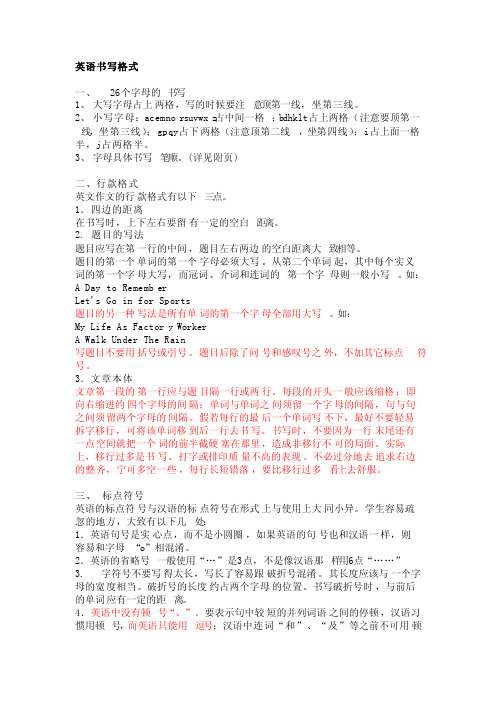
英语书写格式一、26个字母的书写1、大写字母占上两格,写的时候要注意顶第一线,坐第三线。
2、小写字母:acemnorsuvwxz占中间一格;b dhklt占上两格(注意要顶第一线,坐第三线);gpqy占下两格(注意顶第二线,坐第四线);i占上面一格半,j占两格半。
3、字母具体书写笔顺。
(详见附页)二、行款格式英文作文的行款格式有以下三点。
1.四边的距离在书写时,上下左右要留有一定的空白距离。
2. 题目的写法题目应写在第一行的中间,题目左右两边的空白距离大致相等。
题目的第一个单词的第一个字母必须大写。
从第二个单词起,其中每个实义词的第一个字母大写,而冠词、介词和连词的第一个字母则一般小写。
如:A Day to RememberLet's Go in for Sports题目的另一种写法是所有单词的第一个字母全部用大写。
如:My Life As Factory WorkerA Walk Under The Rain写题目不要用括号或引号。
题目后除了问号和感叹号之外,不加其它标点符号。
3.文章本体文章第一段的第一行应与题目隔一行或两行。
每段的开头一般应该缩格;即向右缩进约四个字母的间隔;单词与单词之间须留一个字母的间隔,句与句之间须留两个字母的间隔。
假若每行的最后一个单词写不下,最好不要轻易拆字移行,可将该单词移到后一行去书写。
书写时,不要因为一行末尾还有一点空间就把一个词的前半截硬塞在那里,造成非移行不可的局面。
实际上,移行过多是书写、打字或排印质量不高的表现。
不必过分地去追求右边的整齐,宁可多空一些,每行长短错落,要比移行过多看上去舒服。
三、标点符号英语的标点符号与汉语的标点符号在形式上与使用上大同小异。
学生容易疏忽的地方,大致有以下几处:1.英语句号是实心点,而不是小圆圈,如果英语的句号也和汉语一样,则容易和字母“o”相混淆。
课程纲要七年级英语上冯云舒MicrosoftWord文档
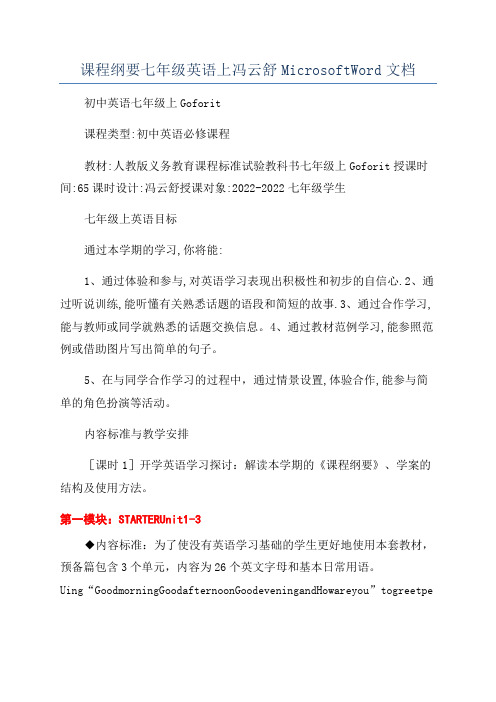
课程纲要七年级英语上冯云舒MicrosoftWord文档初中英语七年级上Goforit课程类型:初中英语必修课程教材:人教版义务教育课程标准试验教科书七年级上Goforit授课时间:65课时设计:冯云舒授课对象:2022-2022七年级学生七年级上英语目标通过本学期的学习,你将能:1、通过体验和参与,对英语学习表现出积极性和初步的自信心.2、通过听说训练,能听懂有关熟悉话题的语段和简短的故事.3、通过合作学习,能与教师或同学就熟悉的话题交换信息。
4、通过教材范例学习,能参照范例或借助图片写出简单的句子。
5、在与同学合作学习的过程中,通过情景设置,体验合作,能参与简单的角色扮演等活动。
内容标准与教学安排[课时1]开学英语学习探讨:解读本学期的《课程纲要》、学案的结构及使用方法。
第一模块:STARTERUnit1-3◆内容标准:为了使没有英语学习基础的学生更好地使用本套教材,预备篇包含3个单元,内容为26个英文字母和基本日常用语。
Uing“GoodmorningGoodafternoonGoodeveningandHowareyou”togreetpeople.Uing“WhatithiinEnglihItiamap”andoontoidentifything.Uing“WhatcoloriitItired”toidentifycolor.◆章节重难点:AEIOU五个元音字母和含有五个元音字母发音的字母的分类◆教学安排:[课时2]Unit1Sa字母A-H的听说读写[课时3]Unit1Sa字母A-H的听说读写复习和“GoodmorningGooda fternoonGoodevening的问候语[课时4]Unit1Sb字母A-H的听说读写复习,学习HowareyouIamfine.IamOK的问候语。
[课时5]Unit1Sb字母A-H的元音字母AE以及有发音因素和AE相同的字母和单词。
“GoodmorningGoodafternoonGoodevening的问候语[课时6]Unit2Sa字母I-R的听说读写[课时7]Unit2Sa字母I-R的听说读写复习和“What ithiinEnglihItiamap的确认物体[课时8]Unit2Sb字母I-R的听说读写复习,学习“WhatithiinEnglihItiamap的确认物体和拼写单词。
Microsoft Word 英语文档
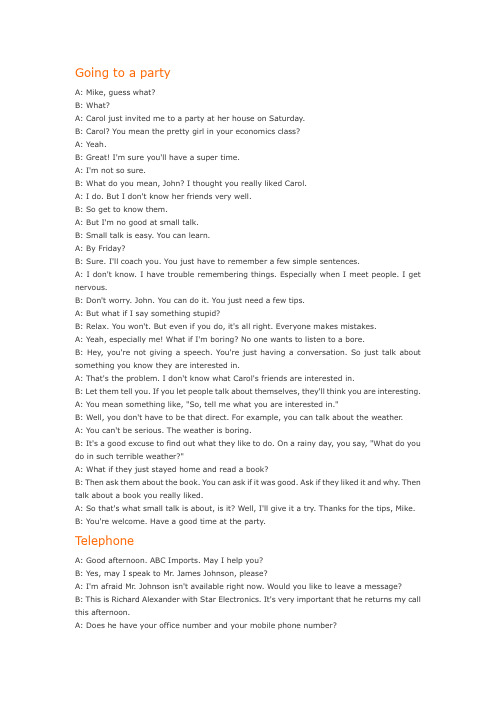
Going to a partyA: Mike, guess what?B: What?A: Carol just invited me to a party at her house on Saturday.B: Carol? You mean the pretty girl in your economics class?A: Yeah.B: Great! I'm sure you'll have a super time.A: I'm not so sure.B: What do you mean, John? I thought you really liked Carol.A: I do. But I don't know her friends very well.B: So get to know them.A: But I'm no good at small talk.B: Small talk is easy. You can learn.A: By Friday?B: Sure. I'll coach you. You just have to remember a few simple sentences.A: I don't know. I have trouble remembering things. Especially when I meet people. I get nervous.B: Don't worry. John. You can do it. You just need a few tips.A: But what if I say something stupid?B: Relax. You won't. But even if you do, it's all right. Everyone makes mistakes.A: Yeah, especially me! What if I'm boring? No one wants to listen to a bore.B: Hey, you're not giving a speech. You're just having a conversation. So just talk about something you know they are interested in.A: That's the problem. I don't know what Carol's friends are interested in.B: Let them tell you. If you let people talk about themselves, they'll think you are interesting. A: You mean something like, "So, tell me what you are interested in."B: Well, you don't have to be that direct. For example, you can talk about the weather.A: You can't be serious. The weather is boring.B: It's a good excuse to find out what they like to do. On a rainy day, you say, "What do you do in such terrible weather?"A: What if they just stayed home and read a book?B: Then ask them about the book. You can ask if it was good. Ask if they liked it and why. Then talk about a book you really liked.A: So that's what small talk is about, is it? Well, I'll give it a try. Thanks for the tips, Mike. B: You're welcome. Have a good time at the party.TelephoneA: Good afternoon. ABC Imports. May I help you?B: Yes, may I speak to Mr. James Johnson, please?A: I'm afraid Mr. Johnson isn't available right now. Would you like to leave a message?B: This is Richard Alexander with Star Electronics. It's very important that he returns my call this afternoon.A: Does he have your office number and your mobile phone number?B: I think so, but let me give them to you again.A: Okay.B: My office number is 714-555-2000, my cell phone number is 909-555-2308. He can reach me at my office number before 6 p.m. or anytime today on my mobile.A: Very well, I'll give him your message as soon as he returns to the office. ShoppingMark: Excuse me, where can we find women's wear?Receptionist: On the second floor. You can take the escalator on your right.Mark: Thank you.Salesperson: Good morning. Can I help you?Ann: No, thanks. We're just looking.Mark: How about this red dress, Ann? It's very fashionable.Ann: I don't know. I'm not crazy about red. I think it's a bit too bright for me. Salesperson: How about this white dress? It's a new arrival for the season.Ann: Is it? It looks pretty. But is it very expensive?Mark: Let me see the price tag. It says $299.Ann: That's too expensive for me. I'd like something below $200.Salesperson: What about this blue dress? It's on sale. It's 10% off, so it's only $126. Ann: Mmm. I like the color. Do you think it'll look good on me, Mark?Mark: I think so. Why don't you try it on?Salesperson: What size do you take?Ann: Medium.Salesperson: Here's a medium in blue. The fitting room is right behind you.Ann: (wearing the dress) What do you think of it, Mark?Mark: It's very nice. I think blue suits you. And it fits perfectly.Ann: Great. I think I'll take it.Mark: That's a good deal.Salesperson: Will that be cash or charge?Ann: Cash, please.Going on vacationA: Hi, Ellen. How was your vacation?B: Great! I went to Bangkok.A: Really? Why did you decide to go there?B: Well, I have a cousin who lives there. She's been trying to get me to take a vacation down there for a long time, and so, finally, she talked me into it.A: I've seen some pictures of Bangkok -- the architecture there is really interesting, isn't it? B: Yes, it's incredible, especially the Grand Palace. The Buddhist temples, too, are very impressive. And I love the spicy Thai food and tropical fruits there.A: How was the weather when you were there?B: That's about the only thing I didn't enjoy. It was really hot and sticky. In fact, April is its hottest month. The best time to go is during the cool season, which lasts from November to February.A: Did you go to some other places beside Bangkok?B: Sure. I went to Pattaya. It's a famous resort, only two hours' drive from Bangkok. There's plenty to enjoy: fine sand, blue sky, clear water, colorful night life...A: Well, it sure sounds like you had a great time.B: Oh, I sure did. And I plan to go back there next year. I'd like to visit Phuket, the biggest island of Thailand. It's world-famous as a seaside resort.BankingCustomer 1: Boy, it's busy today.Customer 2: I wish that guy up there would hurry up. He sure is taking a long time.A: Huh? That's strange. Why did that happen?Bank clerk: Excuse me, sir, is there a problem?A: Well, yes, I don't really understand it. When I put my card in, the machine ate it.Bank clerk: Ate it? You mean it didn't give it back?A: Yes, that's right. It kept it.Bank clerk: Did you press the withdrawal button and the amount you want?A: Yes.Bank clerk: How about your secret code? Did you enter your number?A: Well... come to think of it, it did ask me three times to enter my code.Bank clerk: Are you sure you entered your correct number?A: Hmm, I think so, but maybe I made a mistake.Bank clerk: I see. Well, you probably entered the wrong number. When a machine receives a wrong number three times it automatically keeps the card.A: Oh, I didn't know that. So how do I get another card?Bank clerk: That's no problem... first you need to fill in a form so we can get you a new one. Could you come over to the counter?A: Very sorry about that. (To the other customers) Sorry to keep you waiting.Bank clerk: OK, please fill this in with your account number and today's date. Then we can issue you a new card. You'll get it in about a week.A: OK, thanks very much, and I'm sorry for the trouble.Bank clerk: Not at all, sir. And when you receive your new card, it's a good idea to memorize the number or make a note of it somewhere.A: Right, I'll do that.How to Improve Your Conversation SkillsTo speak to people in a foreign language requires courage and a willingness to make errors. Some people are so afraid of making mistakes that they never open their mouths. And that's the biggest mistake of all. Now if you have courage and are ready to make a few errors, what do you say?First of all, you have to open the conversation. Finding an appropriate topic is half the battle. Some topics, such as the weather and news, work well. But others, such as age, money or people's appearance do not. The following are some good ways to open a conversation.Weather -- It sure is cold today, isn't it?News -- Did you hear about that terrible forest fire?A conversation in a foreign language doesn't always go smoothly. Sometimes your partner talks too fast and you find it difficult to follow. Not to worry, though. You can always ask your partner to repeat what he has said or to speak more slowly. For example, "Excuse me, but could you say that again? I didn't catch it." Or "Could you speak more slowly, please?"At the end of a conversation you need to find a way to close it in a polite way. "Well, I really need to be going" or "It was nice talking to you" are frequently used by people to end a conversation.Compus lifeR: Good morning. Can I help you?S: Yes, please. I'm a new student and I'd like to have some information about the ... em ... the accommodation for students.R: Right. The university provides two types of accommodation, halls of residence and self-catering accommodation.S: How much does it cost for the self-catering accommodation?R: For a single room, thirty-seven pounds eighty-six per week, that's about five forty-one a day. For a double room, it's fifty-two seventy-eight per week. This will apply throughout this academic year.S: I'd like to stay in the self-catering accommodation. How far is that from the residence to the university?R: It all depends. The residences at 36 Elms Road and 110 Palm Road are about one and a half miles from the university main site and the Freemen's Common Houses at William Road are half a mile.S: When do I need to apply?R: Are you an undergraduate or a postgraduate?S: Undergraduate.R: Then you should apply for it as soon as possible, since places in university-owned accommodation are limited and if you don't apply before the end of the month, you are not likely to get a place.S: Could you possibly tell me what to do, if no vacancy is available?R: Yes, you may consider private accommodation. The university runs an Accommodation Information Office and its staff will help you.S: Where's the office?R: In the Students' Union Building.S: Whom can I contact?R: Mr. Underwood. David Underwood, the manager of the Accommodation Information Office. S: Thank you very much.R: You are welcome.。
新人教版七年级英语下册完成句子专项练习(二)Microsoft-Word-文档doc
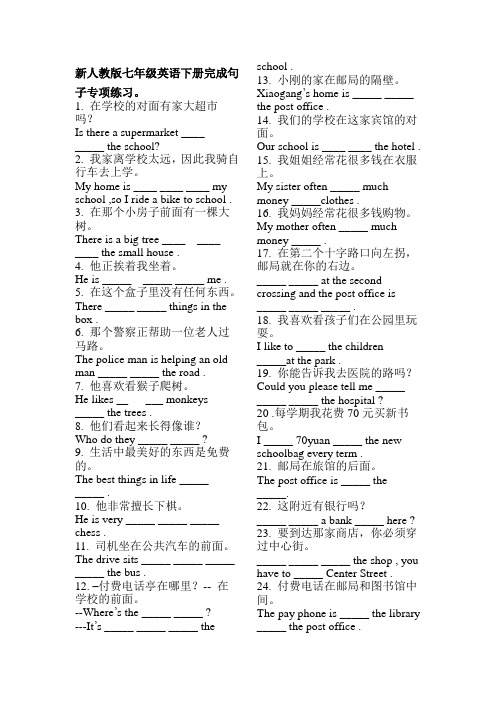
新人教版七年级英语下册完成句子专项练习。
1. 在学校的对面有家大超市吗?Is there a supermarket _________ the school?2. 我家离学校太远,因此我骑自行车去上学。
My home is ____ ____ ____ my school ,so I ride a bike to school .3. 在那个小房子前面有一棵大树。
There is a big tree ____ ________ the small house .4. 他正挨着我坐着。
He is _____ _____ _____ me .5. 在这个盒子里没有任何东西。
There _____ _____ things in the box .6. 那个警察正帮助一位老人过马路。
The police man is helping an old man _____ _____ the road .7. 他喜欢看猴子爬树。
He likes __ ___ monkeys_____ the trees .8. 他们看起来长得像谁?Who do they _____ _____ ?9. 生活中最美好的东西是免费的。
The best things in life __________ .10. 他非常擅长下棋。
He is very _____ _____ _____ chess .11. 司机坐在公共汽车的前面。
The drive sits _____ _____ _____ _____ the bus .12. –付费电话亭在哪里?-- 在学校的前面。
--Where’s the _____ _____ ?---It’s _____ _____ _____ the school .13. 小刚的家在邮局的隔壁。
Xiaogang’s home is _____ _____ the post office .14. 我们的学校在这家宾馆的对面。
初一上英语课文Microsoft Office Word 文档

Unite1 making friendsAnna’s blogsAbout meMy name is Anna , I’m from Germany .I’m 11 years old . I’m tall and thin . I have long hair .I live with my family in a house close to some mountains . My mum is an art teacher . My dad is a doctor. I have an elder sister and an elder brother.About my school and my hobbiesEvery day , I go to school by bus . My favourite subjects are Maths ,Art and Science .I like my school because my teachers are very friendly .My dream is to be an engineer.I like many sports. I’m good at swimming and playing basketball . These are my favourite hobbies.I want to make friends with young people from all over the world!Email me, please!Unite 2 daily lifeA day at schoolBy samI’m a junior high school student. I love going to school.My school is close to my home , so I always go to school on foot. Classes start at 8 a.m., and I am seldom late. My favourite subject is Geography . I enjoy leaning about different places in the world.In the morning , we usually study Chinese, Maths and English. We have our morning break at 9:50 a.m. when the bell rings, I run to the playground with my best friends Tom and Jack .we often play games . Break ends at 10:10 a.m. How short it is!Lunch is from 11:50 to 12:30 p.m. Afternoon classes end at 3:30p.m. Then Tom , Jack and I take part in the school band practice . We make great music together.I always have a good time at school.Unit 3 The EarthProtect The EarthThe earth is a beautiful place .there are forests and rivers , mountains and fields . Some places are very hot , and some are very cold.There are many different plants. Some are large .some are small . All plants need light and water. There are different animals on earth too. Some live on the land . Some fly in the sky .some live under the water.There are also many people like you and me on the earth . The earth provides us with air , water and food . It is our home. Today , there is a lot of pollution .We burn things to make energy .This pollutes the air .We put our rubbish into the sea and under the ground . This pollutes the earth and kills animals and plants .We must stop doing these things . It is important for us to protect the earth for our future .。
新版七级初一上下全册英语单词汇表有音标

七年级上册单词表Starter Unit 1good /gud/ adj. 好的morning /'m?:ni?/ n. 早晨;上午Good morning! 早上好!hi /hai/ interj. (用于打招呼)嗨;喂hello /h?'l?u/ interj. 你好;喂afternoon /,a:ft?'nu:n/ n. 下午Good afternoon! 下午好!evening /'i:vni?/ n. 晚上;傍晚Good evening! 晚上好!how /hau/ adv. 怎样;如何are /a:/ v. 是you /ju:/ pron. 你;你们How are you? 你好吗?I /ai/ pron. 我am /?m/ v. 是fine /fain/ adj. 健康的;美好的thanks /θ??ks/ interj.&n. 感谢;谢谢OK /?u'kei/ interj.& adv. 好;可以Starter Unit 2what /w?t/ pron.&adj. 什么is /iz/ v. 是this /eis/ pron. 这;这个in /in/ prep. (表示使用语言、材料等)用;以English /'i?gli?/ n. 英语adj. 英格兰的;英语的in English 用英语map /m?p/ n. 地图cup /k?p/ n. 杯子ruler /'ru:l?/ n. 尺;直尺pen /pen/ n. 笔;钢笔orange /'?rind?/ n. 橙子jacket /'d??kit/ n. 夹克衫;短上衣key /ki:/ n. 钥匙quilt /kwilt/ n. 被子;床罩it /it/ pron. 它a /?/ art. (用于单数可数名词前)一(人、事、物) that /e?t/ pron. 那;那个spell /spel/ v. 用字母拼;拼写please /pli:z/ interj. (用于客气地请求或吩咐)请Starter Unit 3color /'k?l?/ n. (=colour) 颜色red /red/ adj.& n. 红色(的)yellow /'jel?u/ adj.& n. 黄色(的)green /gri:n/ adj.& n. 绿色(的)blue /blu:/ adj.& n. 蓝色(的)black /bl?k/ adj.& n. 黑色(的)white /wait/ adj.& n. 白色(的)purple /'p?:pl/ adj.& n. 紫色(的)brown /braun/ adj.& n. 棕色(的);褐色(的)the /ei; e?/ art. 指已提到或易领会到的人或事now /nau/ adv. 现在;目前see /si:/ v. 理解;明白can /k?n/ modal v. 能;会say /sei/ v. 说;讲my /mai/ pron. 我的Unit 1name /neim/ n. 名字;名称nice /nais/ adj. 令人愉快的;宜人的to /tu:/ 常用于原形动词之前,该动词为不定式meet /mi:t/ v. 遇见;相逢too /tu:/ adv. 也;又;太your /j?:/ pron. 你的;你们的Ms. /miz/ (于女子的姓名前,不指明婚否)女士his /hiz/ pron. 他的and /?nd/ conj. 和;又;而her /h?:/ pron, 她的yes /jes/ interj. 是的;可以she /?i:/ pron. 她he /hi:/ pron. 他no /n?u/ interj. 不;没有;不是not /n?t/ adv. 不;没有zero /'zi?r?u/ num. 零one /w?n/ num. 一two /tu:/ num. 二three /θri:/ num. 三four /f?:/ num. 四five /faiv/ num. 五six /siks/ num. 六seven /'sevn/ num. 七eight /eit/ num. 八nine /nain/ num. 九telephone /'telif?un/ n. 电话;电话机number /'n?mb?/ n. 号码;数字phone /f?un/ n. 电话;电话机telephone/phone number 电话号码first /f?:st/ adj. 第一first name 名字last /la:st/ adj. 最后的;末尾的last name 姓friend /frend/ n. 朋友China /'t?ain?/ 中国middle /'midl/ adj. 中间的;中间school /sku:l/ n. 学校middle school 中学;初中Unit 2sister /'sist?/ n. 姐;妹mother /'m?e?/ n. 母亲;妈妈father /'fa:e?/ n. 父亲;爸爸parent /'pe?r?nt/ n. 父(母)亲brother /'br?e?/ n. 兄;弟grandmother /'gr?nm?e?/ n.(外)祖母;奶奶grandfather /'gr?nfa:e?/ n. (外)祖父;爷爷;grandparent/'gr?npe?r?nt/ n.祖父(母);family /'f?m?li/ n. 家;家庭those /e?uz/ pron. 那些who /hu:/ pron. 谁;什么人oh /?u/ interj. 哦;啊these /ei:z/ pron. 这些they /eei/ pron. 他(她、它)们well /wel/ interj. 嗯;好吧have /h?v/ v. 经受;经历Have a good day! (表示祝愿)过得愉快!bye /bai/ interj. (=goodbye)再见son /s?n/ n. 儿子cousin /'k?zn/ n. 堂兄(弟、姐、妹);表兄grandpa /'gr?npa:/ n. (外)祖父;爷爷;外公mom /m?m/, /ma:m/ n. (=mum)妈妈aunt /a:nt/ n. 姑母;姨母;伯母;婶母;舅母grandma /'gr?nma:/ n.(外)祖母;奶奶;外婆;dad /d?d/ n. 爸爸uncle /'??kl/ n. 舅父;叔父;伯父;姑父;舅父daughter /'d?:t?/ n. 女儿here /hi?/ adv. (用以介绍人或物)这就是;在这里photo /'f?ut?u/ n. 照片of /?v, ?v/ prep. 属于(人或物);关于(人或物) next /nekst/ adj.&n. 下一个(的);接下来(的)picture /'pikt??/ n. 照片;图画girl /g?:l/ n. 女孩dog /d?g/ n. 狗Unit 3pencil /'pensl/ n. 铅笔book /buk/ n. 书eraser /i'reiz?/ n. 橡皮box /b?ks/ n. 箱;盒pencil box 铅笔盒;文具盒schoolbag /'sku:lb?g/ n. 书包dictionary /'dik??n?ri/ n. 词典;字典his /hiz/ pron. 他的mine /main/ pron. 我的hers /h?:z/ pron. 她的excuse /ik'skju:z/ v. 原谅;宽恕me /mi:/ pron. (I的宾格)我excuse me 劳驾;请原谅thank /θ??k/ v. 感谢;谢谢teacher /'ti:t??/ n. 老师;教师about //?'baut/ prep. 关于What about...?(询问消息或提出建议..怎么样?yours /j?:z/ pron. 你的;你们的for /f?:/ prep. 为了;给;对thank you for... 为......而感谢help /help/ v.&n. 帮助;援助welcome /'welk?m/ adj. 受欢迎的You're welcome. 别客气。
初一英语阅读21英语报MicrosoftWord文档

Dancing aunties让我惊讶的中国广场舞Walking in the winter park,the wind is cold and leaves have escaped the trees. As I keep walking, I hear some music. A group of women is dancing in the park!It seems that (看来好像)if you go to any public place around China, you’ll see these dancing aunties. When I first came to China, it soon struck(让---印象深刻)me . That’s because in Britain ,dancing in public is not common(普遍的). Usually, old people just take a walk for exercise.However, some people don’t like these dancing aunties. They find them annoying.(烦人的)But others respected(尊重)their right to dance in public.I like seeing these women enjoying themselves. They show us the importance of exercising as we get older. And most of them have raised (养育)whole families. Now it is their time to have fun and enjoy themselves.1. Keep doing sth 一直做某事昨天下午他一直在操场上跑。
完整word版,人教版新教材七年级英语上册知识点总结及习题.,推荐文档
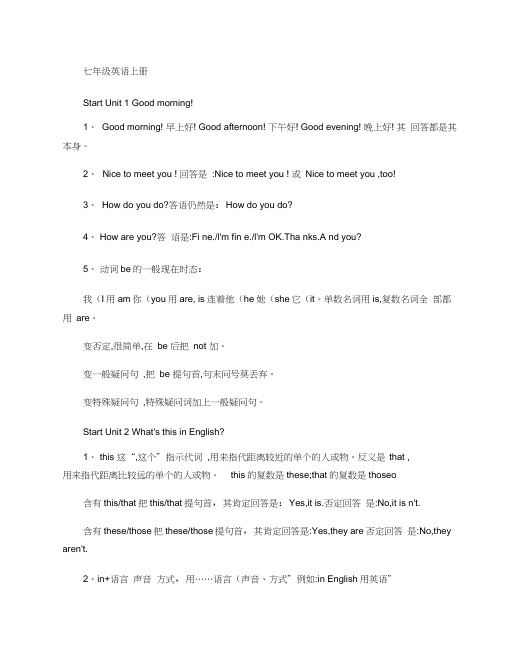
七年级英语上册Start Unit 1 Good morning!1、Good morning! 早上好! Good afternoon! 下午好! Good evening! 晚上好! 其回答都是其本身。
2、Nice to meet you ! 回答是:Nice to meet you ! 或Nice to meet you ,too!3、How do you do?答语仍然是:How do you do?4、How are you?答语是:Fi ne./l'm fin e./l'm OK.Tha nks.A nd you?5、动词be的一般现在时态:我(I用am你(you用are, is连着他(he她(she它(it。
单数名词用is,复数名词全部都用are。
变否定,很简单,在be 后把not 加。
变一般疑问句,把be 提句首,句末问号莫丢弃。
变特殊疑问句,特殊疑问词加上一般疑问句。
Start Unit 2 What's this in English?1、this 这“,这个”指示代词,用来指代距离较近的单个的人或物。
反义是that ,用来指代距离比较远的单个的人或物。
this的复数是these;that的复数是thoseo 含有this/that把this/that提句首,其肯定回答是:Yes,it is.否定回答是:No,it is n't.含有these/those把these/those提句首,其肯定回答是:Yes,they are否定回答是:No,they aren't.2、in+语言声音方式,用……语言(声音、方式”例如:in English用英语”3、a+辅音音素开头的单词或字母(读音an+元音音素开头的单词或字母(读音4、What's this in English?回答是:lt's a/an+可数名词单数。
5、What're these in English?回答是:They are+可数名词复数或不可数名词。
(完整word)初一英语上下各类作文范文共32篇

1. My Friend (我的朋友)I have a good friend. Her name is May. She is 12 years old.Her telephone number is 87634966 Her birthday is March 5th. She isgood at English and Chiese.Sheoften plays the piano. She likesreading books and listening to the music. Her hobbies are reading and listening to music. She is a nice girl. We often help each other. We are good friends. 2. 假设你是李枚,下面的照片是你的全家福,请你写一 篇文章介绍你的家庭。
Hello,everyone!I'm LiMei.Look! This is my family photo. This is my grandmother. She is 58. This is my father. He is a teacher.He is 36. and my mother is 36, too. Who 's that boy? Oh, he is my brother. He is 13 and I am 12. My brother and I are students.3. 假设这是 TOM 的房间,请你用 80 词左右介绍他的房 间。
Look! This is Tom 's room. His photos are on the wall. His 在抽屉里。
计算机在书桌上。
汤 T-shirt is on the bed. His baseball bat isbehind the dresser.姆的棒球在哪里?哦, 在床底下。
英语人教版七年级上册word

class .
Step8 Summary & Homework
Do the 2.Read and recite Section A, carefully. 1b. 3.Write down the Chinese meaning of the new words and key sentences. Unit 3 Is this your pencil? The First Period
Step4 Practice ( 1c )
1.Ask students to practice the 1. Talk about the conversations in pairs. conversations in pairs. 2.Encourage Ss to greet their 2.Actouttheirconversation classmates. s. 3.Invite some pairs to role-playtheir conversations for the class. 1.Ask Ss to look at the 1.Listento the conversations and pictures and say out the number the pictures 1 names of the things in to 4 . English. 2.Have them listen and check 2.Listen again and check the things they hear. the things. 3.Have Ss work in pairs to 3. Check the answers by asking a pair of correct their answers. students to read the 4. Have the Ss listen to the conversation. recording again and complete the conversation with the word in the box according to the tape. 5.Check the answers .
- 1、下载文档前请自行甄别文档内容的完整性,平台不提供额外的编辑、内容补充、找答案等附加服务。
- 2、"仅部分预览"的文档,不可在线预览部分如存在完整性等问题,可反馈申请退款(可完整预览的文档不适用该条件!)。
- 3、如文档侵犯您的权益,请联系客服反馈,我们会尽快为您处理(人工客服工作时间:9:00-18:30)。
2013年新版新目标英语七年级下册单词表____ 1 ___ ___ ____ ___ _____ _?______ _.吉他____ _.唱;唱歌____ _.游泳_____ _.跳舞;舞蹈____ _.画_____ _.国际象棋____ _____ 下国际象棋_____ _.说;说话_____ _______ 说英语____ _.参加;加入____ _.俱乐部;社团__ ____ __… 擅长于……____ _. _讲述;告诉_____ _故事;小说_____ _.写作,写字____ _.演出;表演_.展示;__ ____.或者____ _. _说话;谈话____ __ … 跟……说______ _.(中国)功夫____ _.鼓____ ___ _____ 敲鼓_____ _.钢琴____ ___ _____ 弹钢琴______ _.小提琴____ ___ ______ 拉小提琴____ ___也;而且______ _人;人们____ _ 家,活动本部.___到家;在家__ ____ ____… 善于应付……的;对……有办法____ _.使成为;制造____ _______ 结交朋友_____ ___.在今天____ (__) ____ ___ 在某方面帮助(某人)______ _(=______)中心,中央_______. _.周末__ ___ _______. (在)周末_____ _教,讲授________ _.音乐家____ 莉萨(女名)____ 吉尔(女名)_____ 彼得(男名)____2 ____ ____ __ ___ __ __ _ _______ ___ 向上___ __ 起床;站起_____ _.穿衣服_.连衣裙___ _______ 穿上衣服_____ _.刷刷净_.刷子_____ _.(__. _____)牙齿______ _._淋浴;淋浴器(间)____ _ ______ 洗淋浴_______ ___.通常地;一般地_____ ___.四十___ ______.(表示惊奇或敬佩)哇;呀_____ ___从不;绝不_____ ___. ___早(的)_____ ___.五十___ _.工作;职业____ _.& _.工作_______ _.电视台;车站_____ _______ 广播电台_'_____ ___.(表示整点)…点钟_____ _.晚上;夜晚_____ ___奇怪的;滑稽好笑的________ _._锻炼;练习__ ________. (在)周末____ ___.& ___.最好的(地)____ _.一半,半数____ ____.晚于;过(时间)___.过去的_______ _.一刻钟;四分之一________ _.家庭作业__ (___’_) ________ 做作业___ _ 跑;奔_____ _打扫;弄干净;___干净的____ _.&_.行走;步行____ _ ____ 散步走一走_______ ___很快地______ ___或者;也(用在否定词组后)______…__ ……要么……要么……;或者……或者……___ ____. 大量;许多____ __ 大量;许多_________ ___.有时_____ _.有…的味道;品尝_.味道;滋味____ _.生活,生命____ 里克(男名)___ 吉姆(男名)_____ 斯科特(男名)____ 托尼(男名)____3 ___ __ ___ ___ __ ___________ _.火车___ _.公交车______ _.地铁____ ___ ______ 乘地铁____ _骑_旅行____ _.自行车_____ _ ____ 骑自行车_____ ___.六十_______ ___.七十______ ___.八十______ ___.九十_______ ___.一百______ _.分钟___ ___.&___远;远的_________ _.公里___ ___.新的;刚出现的_____ ___.每一;每个_____ ___ 每天__ ____.(表示方式)乘(交通工具)__ ____ 骑自行车_____ _.开车___ _.小汽车;轿车____ _.居住;生活____ _.车站;停止_____ __ 认为_____ _.横过;越过_____ _.河;江____ ___.&____.许多_______ _.村庄;村镇_______ ____.介于…之间_______…___… 在……和……之间______ _.桥____ _.小船_______ _.索道____ _.年;岁______ ___.害怕;惧怕____ ____.像;怎么样_____ _.离开_____ _.梦想;睡梦_.做梦____ ___.真的;符合事实的____ ____ 实现;成为现实____ 戴夫(男名)____4 ___’_ ___ __ _____1、____ _.规则;规章2、______ _.到达3、(__) __ ____ 准时4、_______ _.走廊;过道5、____ _.大厅;礼堂6、______ ____ 餐厅7、______ _.听;倾听8、______ __… 听……9、_____ _. &_.打架;战斗10、_____ ___.抱歉的;难过的;惋惜的11、_______ ___在外面___ 外面的12、____ _.穿;戴13、_________ ___.重要的14、_____ _.带来;取来15、_______ _.校服;制服16、_____ ___安静的17、___ ___.外出18、__ ___ 外出(娱乐)19、________ _.& _.练习20、____ _.碟;盘21、__ ___ ______ 清洗餐具22、______ ____. ____在… 以前___以前23、____ (___’_) ___ 铺床24、_____ ___.脏的25、_______ _.厨房26、____ ___. ____.更多的27、_____ ___.吵闹的28、_____ _.放松;休息29、____ _.读;阅读30、________ ___.非常讨厌的;可怕的31、____ _.感受;觉的32、______ ___.严格的;严厉的33、__ ______ (____ __) (对某人)要求严格34、________ _.记住;记起35、______ _.遵循;跟随36、______ ___ _____ 遵守规则37、____ _.幸运;运气38、____ _.保持;保留39、____ _.头发;毛发40、_____ _. 学习;学会_____ 克拉克(姓;男名)___ 埃米(女名)_____ 莫莉(女名)___ ____ 纽约____5 ____ __ ___ ____ ______ _____ _. 熊猫___ _.动物园_____ _.老虎________ _.大象_____ _. 树袋熊____ _.狮子_______ _. 长颈鹿______ _ .动物____ ___.可爱的;机灵的____ ___.懒散的;懒惰的_____ ___ 聪明的_________ ___ 美丽的;美好的_____ ___吓人的;恐怖的____ _ 种类____ __ 稍微;有点儿_________ _. 澳大利亚_____ ___ 南方的_ 南;南方______ _.非洲_____ ______ 南非___ _. 宠物___ _. 腿___ _. 猫_____ _睡觉________ ___ .友好的___ ___. 羞怯的;腼腆的____ _ .救;救助______ _.象征____ _. 旗;旗帜______ _.忘记;遗忘___ ____ 迷路_____ _ .地点;位置_____ _.水______ _. 危险__ __ (_____) ______ 处于(极大)危险之中___ _ .砍;切____ ___.(坐、躺、倒)下___ _.向下;沿着___ ____ 砍倒____ _. 树____ _.杀死;弄死_____ _.象牙____ ____ .超过;多于;在… 上方(__) ____ __ 由……制成的_____ 朱莉(女名)_____ 贝姬(女名)________ _.泰国____ _.泰国(人的);泰语(的)____6 _’_ ________ ___________ _ .报纸____ _ _________ 看报纸___ _.使用;运用____ _.汤____ ____ 做汤____ _.洗_____ _.电影__ __ ______ 看电影____ ___ .只是;恰好___ ___ 出去吃饭_____ _.房子_____ _..喝_.饮料___ _.茶;茶叶_____ ___ 喝茶________ ___在明天_.明天;未来____ _.游泳池;水池____ _. 购物_.商店___________ _. 超市___ _男人;人____ _.竞赛____ _.主人;东道主_____ _. _学习;研究_____ _ 洲___ ______ ______ 美国;美利坚合众国________ ___美国的;美洲的_美国人;美洲人______ _.龙______ ____ ________ 端午节___ ___.任何的.任一的____.任何;任一_____ ___另外的;其他的____.另外的人(或物)_____ ___幼小的,年轻的________ _ 儿童____ _.怀念. 思念____ _ 希望_________ .___ 可口的.美味的_____ .___. 还.仍然______ ____ 客厅_____ 史蒂夫(男名)_____ 劳拉(女名)____7 __'_ _______!____ _.下雨_.雨水_____ ___.多风的______ ___多云的_____ ___晴朗的____ _.下雪;雪___________ _.天气____ _.做饭___ ___坏的;糟的____ _.公园_______ _.信息;消息____ _ _______捎个口信;传话___ ____.他(__的宾格)_____ _.能;可以____ ___.回来;回原处____(__)____回电话_______ _.困难;难题_____ ___.再一次;又一次___ ___.干燥的____ ___寒冷的;冷的___ ___热的____ ___温暖的_____ _.拜访;参观______ _.加拿大______ _.夏天;夏季___ _.坐_____ _.果汁;饮料____ ___.不久;很快________ _.假期__(_)________度假____ ___.努力地;困难的______ _.欧洲________ _.高山_______ _.国;国家_____ _.滑冰_____ ___.下雪的______ _.冬天;冬季_______ ___.俄罗斯的;俄罗斯人;俄语_______ _.雪人_____ ___.阴雨的;多雨的___乔(男名)____杰夫(男名)______莫斯科_______多伦多______波士顿____8 __ _____ _ ____ ______ _ ___ ____?____ _.邮政______ _. 办公室____ ______ 邮局______ _.警察______ _______警察局_____ _.旅店;酒店__________ _.餐馆____ _.银行________ _.医院______ _.大街___ _.付费___ _____付费电话____ ____.在……附近_____ ___.过;穿过______ ____在……对面_____ _.前面__ _____ __在……前面______ ____.在……后面____ _.镇;市镇______ ___.&____.到处;大约21、_____ _.北;北方___.北方的22、_____ ____.沿着23、__ _____沿着(这条街)走24、____ _.转向;翻25、_____ ___.向右边;_.右边26、____ ___.向左边_.左边27、____ _____ |/____向右、左转28、________ _.十字路口29、____________ _.街区;街坊30、_____ _.花(时间、钱等)31、_____ ____花时间32、_____ _.爬33、____ _.路34、_____ ___.时常;常常35、___ _.空气36、________ _.阳光37、____ ___免费的38、_____ _.享受;喜爱_____ _______喜欢阅读______ ___.容易地_____ _.钱____9 ____ ____ __ ____ ____? _____ ___.卷曲的________ ___.直的____ ___.高的______ ___. 中等的______ _.身高;高度__ ______ ______中等身高____ ___.瘦的_____ ___.重的_____ _.身材__ ______ _____中等身材_______ ___.&_.今夜12、______ ___.小的13、_ ______ 一点,少量14、______ _.电影院15、_______ _.眼镜16、_____ ___.以后17、________ ___.英俊的18、_____ _.演员19、_______ _.女演员20、______ _.人21、____ _.鼻子22、______ ___.金黄色的23、_____ _.嘴24、_____ ___.圆形的25、____ _.脸26、___ _.眼睛27、______ _.歌手28、______ _.艺术家29、_____ _.犯罪活动30、________ _.罪犯31、___ _.放32、____ ___.&____.每个,各自33、___ _.方式,路线34、________ _.描述35、___________ ___.不同地36、_______ ___.&____另一,又一37、___ _.结尾,尽头38、__ ___ ___最后39、____ ___..真正的;真实的40、_____ _.牛仔裤______约翰尼(男名)____迪安(姓)____蒂娜(女名)_______杰克逊(姓)____10 _'_ ____ ____ _______.______ _.面条______ _.羊肉____ _.牛肉_______ _.卷心菜;洋白菜______ _.土豆;马铃薯_______ _.特色菜;特价品;特别的;特殊的7、_____ _.(表示意愿)愿意8、_____ ____愿意;喜欢9、___ ___(常用于否定句或疑问句)还;仍然10、_____ ___.大号的;大的11、_____ _.&_.点菜;命令12、____ ___'_ _____点菜13、____ _.大小;尺码14、____ _.碗15、___(_____)____ __一(大)碗16、____ _豆腐17、____ _.(可食用的)肉18、________ _.饺子19、________ _.粥;面糊20、_____ _.洋葱21、____ _.鱼;鱼肉22、_______ _.烙饼;薄饼23、_____ _.世界24、______ ___ _____世界各地25、______ _.答案_.回答26、_________ ___.不同的27、____ _.蛋糕28、______ _.蜡烛29、___ _.年龄30、____ _ ____许愿31、____ _.吹32、____ ___吹灭33、__ ____.如果34、____ _.会35、___ __ _.英国35、_____ _.糖果37、_____ ___.幸运的38、_______ 受欢迎的;普遍的39、___ _______受欢迎;流行40、___ __切碎41、____ _.想法;主意42、_____ ____ ____ __…给……带来好运____11 ___ ___ ____ ______ ___ _?1、____ _.挤奶2、___ _.奶牛3、____ _ ___给奶牛挤奶4、_____ _.马5、____ _ _____骑马6、____ _.喂养;饲养7、____ ________喂鸡8、______ _.农民;农场主9、_____ ___.相当;安全10、_____ _ ___(__…) 许多11、________ ____.(常用于否定句或疑问句)任何东西;任何事物12、____ _.种植;生长;发育13、____ _.农场;务农;种田14、____ _.采;摘15、_________ ___.极好的;优秀的16、___________ _.乡村;农村17、__ ___ ___________在乡下;在农村18、_________ _.昨天19、______ _.花20、_____ _.担心;担忧21、_______ ___.幸运地;好运地22、___ _.太阳23、______ _.博物馆24、____ _.火灾25、____ _______ 消防站26、________ _.油画;绘画27、________ ___.使人兴奋的;令人激动的28、______ ___.可爱的29、_________ ___.昂贵的30、_____ ___.廉价的;便宜的31、____ ___.缓慢的;迟缓的32、____ ___&___快地(的)33、_____ _.机器人34、_____ _.导游;向导35、____ _.礼物;赠品36、___ __ ___总的说来37、__________ ____一切;所有事物38、__________ ___.感兴趣的39、__ __________ __对……感兴趣40、____ ___.黑暗的;昏暗的41、____(_____)_.听到;听见42、_____卡罗尔(女名)____12 ____ ___ ___ __ ____ __ _____?____ _.扎营;扎帐篷____ _.湖,湖泊_____ _.海滩,沙滩_________ _.羽毛球运动_____ _.羊,绵羊__ ___.&____作为,当做_______ ____自然的_________ _.蝴蝶_______ _.游客;访问者9、_____ ___.疲倦的10、____ _.停留11、____ __ ____深夜不留12、____ ___.离开13、___ ____ 跑开14、_____ _.老鼠15、____ _.幼小的16、_____ _.呼叫,喊叫17、_____ __…冲……大声叫嚷18、____ ______(狗叫声)汪汪19、________ _.语言20、___ _.飞21、____ _.风筝22、___ _ ____放风筝23、____ ___.&___高的(地)24、____ ______中学25、___ ___.以前26、_____ _.印度27、____ _.帐篷28、___ __搭起,举起29、____ _.月亮30、________ _.&_.惊奇,惊讶31、___ _ _______吃惊32、_____ _.蛇33、______ ___.惊慌的34、____ _.移动35、_____ __…对……大声喊叫36、_____ _.开始,着手37、____ _.跳跃38、__ ___ ____上上下下39、____ _.弄醒,醒40、____ ____.到……里面41、______ _.森林42、___ _.耳朵43、____露西(女名)七年级上__ ____. 我的____ _. 名字__ _. 是____'_ = ____ __ 名字是_____ _. 钟_ ____. 我的__ _. 是_'_ = _ __ 我是____ ___. 好的;令人愉快的__ ____. 用于与动词原形一起构成动词不定式____ _. 遇见;相逢___ ____. 你;你们____ ____. & ___. 什么____'_ = ____ __ 是什么____ ____. 你的;你们的_____ ______. (表示问候)喂__ ______. (表示问候)嗨___ ____. 他的___ ____. 和;又;而且___ ____. 她的________ _. 问题;难题;询问;疑问______ _. 回答;答复;答案____ _. 看;望;看起来_____ ___. 第一的_____ ____ 名字____ ___. 最后的;上一个的____ ____ 姓氏___ _. 男孩____ _. 女孩____ ___. 零___ ___. 一___ ___. 二_____ ___. 三____ ___. 四____ ___. 五___ ___. 六_____ ___. 七_____ ___. 八____ ___. 九_________ _. 电话______ _. 数;数字_________ ______ 电话号码_____ _. 电话_____ ______ 电话号码__ ____. 它__'_ = __ __ 它是____ _. 卡;卡片__ ____ 身份证______ _. 家;家庭______ ____ 姓氏____ 2____ ____. & ___. 这;这个______ _. 铅笔___ _. 钢笔____ _. 书______ _. 橡皮;铅笔擦;黑板擦_____ _. 尺;直尺____ _. 箱;盒;橱______ ____ 铅笔盒;文具盒________ _. 双肩背包______ _________ 卷笔刀;铅笔刀__________ _. 字典;词典____ ____. & ___. 那;那个___ ___. (表示肯定)是__ ___. (表示否定)不;不是___ ___. (构成否定形式)不是___'_ = __ ___ 不是______ _. 原谅;宽恕______ __ 请原谅(客套语,用于与陌生人搭话、打断别人说话等场合)_____ _. 感谢__ ______. 好;不错__ ____. 用(表示方法,媒介,工具等)_______ _. 英语;英文_ ___. 一个(只,把,台……)___ ___. (指程度)多么;何等;怎样__ _. & ___. 做;干;构成否定句、疑问句的助动词_____ _. 拼写________ _. 棒球_____ _. 手表________ _. 电脑;电子计算机____ _. 游戏________ ____ 电子游戏___ _. 钥匙________ _. 笔记本____ _. 环;戒指____ _. 打电话__ ____. 在……(里面或附近);在……(点、刻);以__ ____. 在……里面___ ___. 表示特指的人、物、事或群体____ _. 遗失_____ _. 找回____ ___ _____ 失物招领______ ______. (祈使句中用作请求的客套话)请______ _. 学校_ ___ __ 一套;一副__ ____. (属于)……_____ 3______ _. 姐;妹______ _. 妈妈;母亲______ _. 爸爸;父亲______ _. 父亲或母亲_______ _. 兄;弟___________ _. 祖母;外祖母___________ _. 祖父;外祖父______ _. 朋友___________ _. 祖父(母);外祖父(母)_____ ____. & ___. 那些___ _. 是____'_ 那是_____ ____. & ___. 这些___ ____. 她__ ____. 他__'_ = __ __ 他是____ _. 姨母;姑母;伯母;婶母;舅母___ _. 儿子______ _. 堂(表)兄弟;堂(表)姐妹________ _. 女儿_____ _. 叔;伯;舅;姨夫;姑父_______ _. 照片;图片____ ___. 亲爱的(冠于信函中的称谓,以示礼貌)___ ____. 为了(表示目的或原因)______ ___ 为……而感谢_____ _. 照片;相片____ ___. 这里;在这里____ 4_____ ___. 在哪里(疑问副词)_____'_ = _____ __ 在哪儿_____ _. 桌子___ _. 床_______ _. 梳妆台________ _. 书橱;书柜____ _. 沙发_____ _. 椅子______ _. 抽屉_____ _. 植物_____ ____. 在……下____ ____. 他们____'__ = ____ ___ 他们是__ ____. 在……上___'_ = __ ___ 不____ _. 知道;了解___ _. 书包;提包;袋子____ _. 数学_____ _____ 闹钟__ ____. 光盘_____ _. 录像;视频____ _. 录音带_____ ____ 录像带___ _. 帽子____ _. 拿走;带到_____ _. 东西;物__ ____. 朝;向;至;达___ _. 妈妈(非正式用语)___ _____ _. 能;可以;会_____ _. 拿来;取来;带来____ ___. & ____. 一些;若干____ _. 需要_____ _. 地板;地面____ _. 房间__ ____. 电视;电视机____ _. 书桌;课桌____ 5____ _. 有______ _. 英式足球____ _. 球______ ____ 英式足球______ _. 网球______ _. 球拍(网球、羽毛球的)______ ______ 网球拍____-____ _. 乒乓球__________ _. 排球__________ _. 篮球___ _. 球拍(乒乓球等的)____ _. & ___. 做;干;构成否定句、疑问句的助动词(动词__的第三人称单数形式_____'_ = ____ ___ 不___ _. 允许;让__ ____. 我们(__的宾格)___'_ = ___ __ 让我们;让咱们____ _. 玩;打(球)____ ______. 喔;噢;唔;这个_____ _. 听起来____ ___. 良好的;令人满意的_____ _. 运动__ ____. 我们____ ___. 大量的____ _. 社团;俱乐部____ ____. 更多的;更大的_____ _. 班级;(一节)课___________ ___. 有趣的;令人感兴趣的______ ___. 无聊的;令人生厌的___ ___. 令人愉快的_________ ___. 困难的________ ___. 轻松的_____ _. 观看;注视_____ __ 看电视___ _. (____的第三人单数形式)有_____ ___. 美妙的;大的__________ _. 收藏品;收集物___ ____. 但是____ ______ 参加体育运动或比赛____ ___. 只;仅仅____ ____. (____的宾格)他(她,它)们_____ ___. 每一;每个___ _. 天;日间;白天;一日____ 6____ _. 喜欢______ _. 香蕉_________ _. 汉堡包______ _. 西红柿________ _. 花椰菜______ _____ 炸马铃薯条;薯条______ _. 橙子___ _. 冰_____ _. 奶油;乳脂___ _____ 冰淇淋_____ _. 沙拉__________ _. 草莓____ _. 梨____ _. 吃;饮__ ______. 啊;噢;呀(表示惊讶等)_________ ____ 可数名词___________ ____ 不可数名词____ _. 食物___ _. 蛋;鸡蛋_____ _. 苹果______ _. 胡萝卜_______ _. 鸡;鸡肉_________ _. 早餐_____ _. 午餐______ _. 晚餐;正餐_____ _. 水果_________ _. 蔬菜;植物______ _. 奔跑者___ _. 吃____ ___. 好;对;满意地___ _. 跑;奔跑____ _. 星星;明星___ ___. 许多;很多____ __ 大量;许多_______ ___. 健康的;强健的_______ _. (饭后的)甜食____ _. 清单复习____ 1 __ 6_________ _. 家具(总称)______ _. 人;人民__ ___. (元音前)一个(只,把,台……)_____ _. 空白____________ _. 交谈;谈话_____ ____. & ___. 另外的人(物);其他的____ ___. 也;亦;并且____ 7___ ____ (价钱)多少_____ _. (__.)裤子____ _. 短袜_____ _. 男衬衣;衬衫_-_____ _. _恤衫______ _. (__.)短裤_______ _. 毛衣____ _. 鞋_____ _. 裙子____ _. 出售;廉价销售______ _. 元(美国、加拿大等国的货币单位,符号为$)_____ _. 色;颜色_____ ___. & _. 黑色(的)_____ ___. & _. 白色(的)___ ___. & _. 红色(的)_____ ___. & _. 绿色(的)____ ___. & _. 蓝色(的)______ ___. & _. 黄色(的)___ ___. 广大的;重大的_____ ___. 小的;小号的_____ ___. 短的;矮的____ ___. 长的_____ _. (银行、办公室、商店等的)职员;办事员____ _. 帮助;援助____ _. 需要;想要____ ___ ___. 给你。
